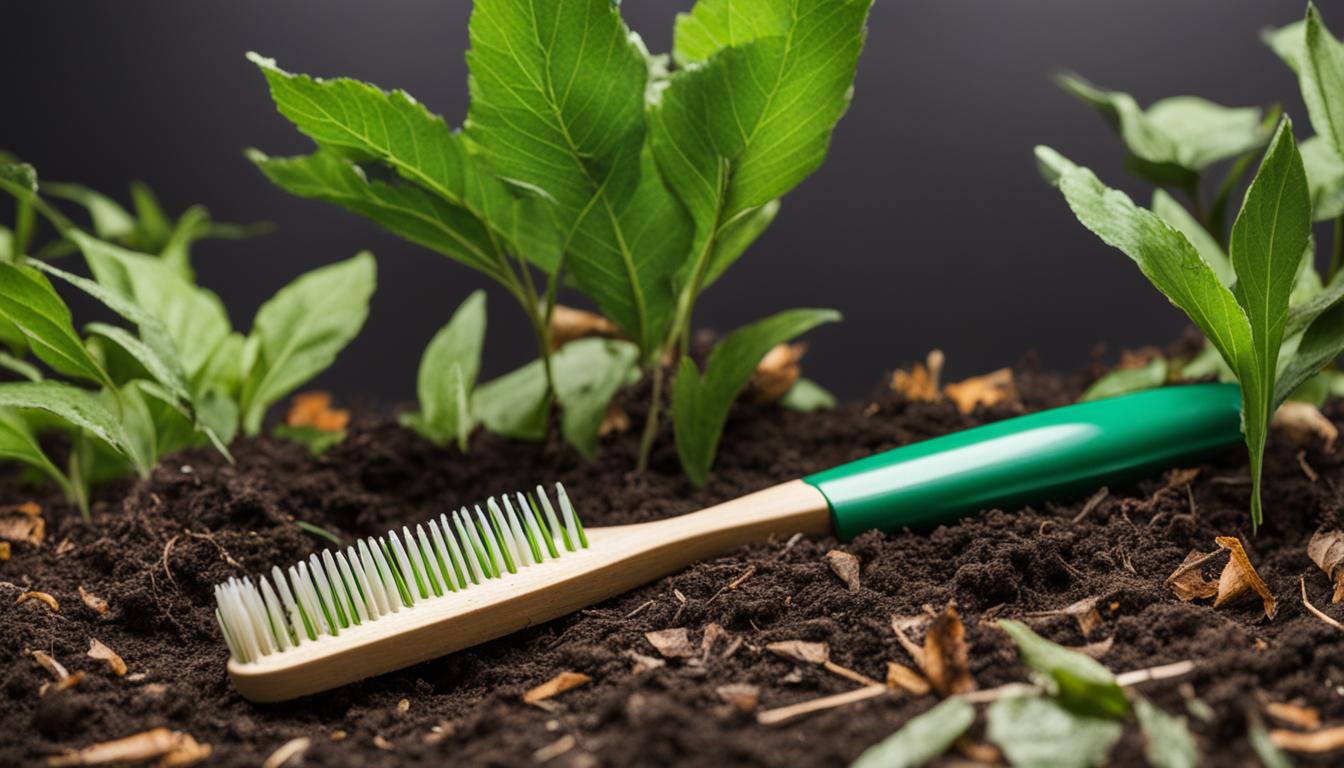Compostable toothbrushes have become increasingly popular as a more sustainable option for oral hygiene. However, there is often confusion and skepticism surrounding their actual compostability. Understanding the materials used in compostable toothbrushes and the proper composting process is essential to harness their environmental benefits effectively.
Contents
- 1 Understanding Compostable Toothbrush Materials
- 2 The Composting Process for Compostable Toothbrushes
- 3 FAQ
- 3.1 Are compostable toothbrushes truly compostable?
- 3.2 What are compostable toothbrushes made from?
- 3.3 Can I compost the entire compostable toothbrush?
- 3.4 How can compostable toothbrushes reduce plastic waste?
- 3.5 Are boar bristle toothbrushes suitable for vegans?
- 3.6 What are the benefits of bamboo toothbrushes?
- 4 Source Links
Key Takeaways:
- Compostable toothbrushes offer a sustainable alternative to plastic toothbrushes.
- The materials used in compostable toothbrushes include bamboo, castor bean oil, Swiss Beechwood, boar bristles, and neem sticks.
- Bamboo toothbrushes are the most common and eco-friendly due to bamboo’s sustainable nature.
- Proper disposal of compostable toothbrushes involves removing bristles and recycling them separately.
- Toothbrush recycling programs like Terracycle accept toothbrush bristles for recycling.
- Composting or recycling toothbrushes helps reduce plastic waste and combat microplastic pollution.
Understanding Compostable Toothbrush Materials
Compostable toothbrushes offer a more sustainable alternative to traditional plastic toothbrushes. These eco-friendly dental care products are typically made from natural materials such as bamboo, castor bean oil, Swiss Beechwood, boar bristles, or even neem sticks. Let’s take a closer look at these compostable toothbrush materials.
Bamboo Toothbrushes
Bamboo toothbrushes are the most common type of compostable toothbrushes available in the market. Bamboo is a fast-growing and sustainable resource, making these toothbrushes an environmentally friendly choice. The handles of bamboo toothbrushes are usually made from Moso bamboo, which is biodegradable and can be composted.
Castor Bean Oil Bristles
Another material used in compostable toothbrushes is castor bean oil. The bristles of these toothbrushes are made from a bio-based nylon derived from castor bean oil. These bristles are USDA-certified biobased and contain no fossil fuel, making them a more sustainable option.
FSC-Certified Swiss Beechwood Handles
Some compostable toothbrushes feature handles made from FSC-certified Swiss Beechwood. The Forest Stewardship Council (FSC) certification ensures that the wood used in these toothbrushes comes from responsibly managed forests. The handles are biodegradable and can be composted as well.
Boar Bristles and Neem Sticks
For those looking for alternative options, compostable toothbrushes made with boar bristles or neem sticks are available. Boar bristles are completely biodegradable, but it’s important to note that they may not be suitable for vegans. Neem sticks, on the other hand, offer a unique alternative but may not be preferred by everyone due to personal preferences or taste.
By understanding the different materials used in compostable toothbrushes, individuals can make informed choices when it comes to selecting sustainable oral hygiene products. Remember to check the packaging or product description for information on compostability and proper disposal methods. Together, we can contribute to waste reduction and promote a greener future.
The Composting Process for Compostable Toothbrushes
Proper disposal of compostable toothbrushes is essential to maximize their environmental benefits. Understanding the composting process allows you to make a positive impact on waste reduction and minimize the generation of harmful microplastics.
When it comes to compostable toothbrushes, the handles made from materials like bamboo or biodegradable substances can typically be composted. However, it is important to note that the bristles may need to be removed before composting. You can recycle the bristles separately through toothbrush recycling programs, such as Terracycle.
By composting or recycling your toothbrush, you prevent it from ending up in landfills or oceans, where it could break down into microplastics, contributing to pollution. Composting organic toothbrushes ensures that they decompose naturally and return to the soil as valuable organic matter.
Remember, responsible toothbrush disposal plays a crucial role in waste reduction and sustainable oral hygiene practices. So, make sure to compost your compostable toothbrushes properly or recycle them through specialized programs. Together, we can make a significant difference in protecting our environment.
FAQ
Are compostable toothbrushes truly compostable?
Yes, compostable toothbrushes are designed to break down in composting environments. However, it is important to follow the proper composting process to ensure their full decomposition.
What are compostable toothbrushes made from?
Compostable toothbrushes are typically made from natural materials such as bamboo, castor bean oil, Swiss Beechwood, boar bristles, or neem sticks.
Can I compost the entire compostable toothbrush?
While the handles of bamboo or biodegradable toothbrushes can be composted, the bristles may need to be removed and recycled separately. Toothbrush recycling programs, such as Terracycle, accept toothbrush bristles for recycling.
How can compostable toothbrushes reduce plastic waste?
By composting or recycling toothbrushes, individuals can effectively reduce plastic waste and prevent them from ending up in landfills or oceans, where they can contribute to the generation of microplastics.
Are boar bristle toothbrushes suitable for vegans?
Boar bristle toothbrushes are completely biodegradable but may not be suitable for vegans, as they are made from animal bristles.
What are the benefits of bamboo toothbrushes?
Bamboo toothbrushes are considered eco-friendly due to the sustainable nature of bamboo. They are a renewable resource and can help reduce the reliance on plastic toothbrushes.





Leave a Reply